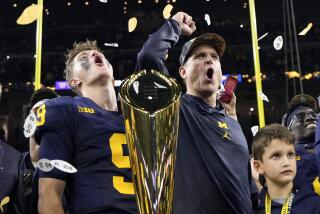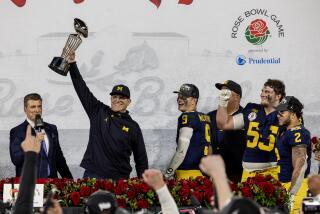AP Says the BCS Cannot Use Poll
The bowl championship series, struggling through another besieged season, suffered a major defection Tuesday when Associated Press said it no longer wants to be included in the complex formula that places two teams in college football’s title game.
The AP poll, voted on by writers and broadcasters, had represented a cornerstone of the BCS equation.
In a cease-and-desist letter, AP stated: “BCS has damaged and continues to damage AP’s reputation for honesty and integrity in its news accounts through the forced association of the AP poll with the BCS rankings.”
Although the BCS is contractually in place for at least five more years, some college football officials wondered how it will maintain a sense of authority.
“I was surprised,” said Tom Hansen, commissioner of the Pacific 10 Conference. “We had no indication of this position by the Associated Press.”
Kevin Weiberg, the Big 12 Conference commissioner who serves as BCS coordinator, issued a brief statement.
“We respect the decision of the Associated Press to no longer have its poll included in the BCS standings,” he said. “Since the inception of the BCS, the AP poll has been a part of our standings. We appreciate the cooperation we have received from the organization in providing its rankings on a weekly basis.”
The AP letter expressed concerns that “any animosity toward BCS may get transferred to AP” and that some of its voters had indicated they might no longer participate.
The BCS was established in 1998 by officials from bowl games, six major conferences and Notre Dame, and has been powered by multimillion-dollar television contracts.
In effect, it was meant to settle differences between the writers’ poll and another one voted on by coaches. Using a formula that also incorporated computer rankings, it has served to determine not only the title game but matchups in three other major bowls.
From the start, the system has been a lightning rod for criticism, which has only intensified in recent years.
Last season, USC finished the regular season atop the AP poll and USA Today/ESPN coaches poll. But the computers knocked the Trojans down to No. 3 in the BCS, leaving them out of the national-championship game at the Sugar Bowl.
The postseason ended with a split champion -- USC and Sugar Bowl winner Louisiana State -- exactly the situation the BCS hoped to eliminate.
At that point, much of the criticism focused on the computers. BCS officials responded by placing greater emphasis on its human polls.
The turmoil continued.
This season, for the first time in the BCS era, three teams from major conferences -- USC, Oklahoma and Auburn -- went undefeated. Auburn finished No. 3 and was left out of the championship game.
No. 1 USC and No. 2 Oklahoma will meet for the title at the Orange Bowl on Jan. 4.
There has been just as much furor over the No. 4 spot, where Texas leapfrogged California in the final week even though Cal won its last game.
The switch sent Texas to the Rose Bowl and precluded Pasadena’s traditional matchup between the champions of the Pacific 10 and Big Ten conferences.
If anything, Cal’s plight raised concerns about anonymous balloting in the coaches’ poll, which is why Hansen and others were startled by AP’s withdrawal.
BCS officials will meet over the next few months to consider alternatives to using the AP poll and continue their overall evaluation of the formula.
There has been some discussion about choosing bowl matchups through a selection committee such as the one that is used in college basketball.
The BCS is hoping to settle on changes by April.
“I think there are different avenues we might approach,” Hansen said. “Until we get a chance to sit down and talk it over, we’ll have to leave that as an unanswered question.”
More to Read
Go beyond the scoreboard
Get the latest on L.A.'s teams in the daily Sports Report newsletter.
You may occasionally receive promotional content from the Los Angeles Times.











